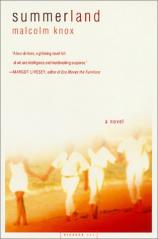Reading Group Guide
Discussion Questions
Summerland: A Novel

1. Identify the four protagonists of Summerland. What did you like and/or dislike about each of them? Which characters were the most interesting or compelling to you, and why? Which were the least so? Point out various descriptions or scenes from the novel in defense of your opinions.
2. The narrator of Summerland is himself a lesser player in the tale he is narrating. Why is this the case? Describe the character of Richard-his likes, dislikes, goals, failures, and so forth. Why is he telling the story of Summerland in the first place? And how does he regard the other three main characters in his tale? Were your own impressions of these characters influenced by Richard's feelings for them? Why or why not?
3. About midway through Chapter 1, Richard differentiates between "proximate causes" and "ultimate causes"-the former being a term that is occasionally and digressively employed throughout his account. Explain the distinction Richard makes between these two terms. Why is his narrative primarily concerned with proximate causes?
4. Discuss the importance of this novel's setting. Where does the majority of the action in Summerland take place, and why and how does this location matter? Why is the novel called Summerland in the first place? What, and where, is the place known as "summerland"?
5. "The people in [this] book, in a sense, grow up very quickly but also don't grow up at all," author Malcolm Knox stated in an interview. Elaborate on this remark. Do you agree with Knox's claim? Explain why or why not, using action or dialogue from the book to support your view.
6. Hugh Bowman, Richard's best friend, is the archetypal Golden Boy, the guy who has everything-looks, wealth, power, and so on. But what exactly-beyond all his material and physical possessions-does Richard see in him? Why does Richard idolize him? Be specific with your answer. And what sort of a friend is Hugh to Richard, both during the beginning chapters and over the whole arc of the novel? Why do they often treat one another so differently?
7. Perhaps even more than money, youth, or love, Summerland is thematically centered on the idea of class. Discuss the ways in which Knox's novel addresses the idea of social class. Why is Richard in particular so obsessed with this idea? And how do the other main characters seem to feel about it? Early in Chapter 12, while he is remembering Hugh's deeply disturbed Uncle Bill, Richard admits: "Yet it was only class that saved us." What is Richard saying here- and what is the broader context of his remark?
8. Summerland is, essentially, a modern retelling of The Good Soldier, the classic novel by Ford Maddox Ford first published in 1915. Reading Summerland, we learn that Pup, Richard's wife and an aspiring novelist, is likewise working on a "plagiarized" version of The Good Soldier, although Richard himself is unfamiliar with Ford's masterpiece. Explain the ironic relationship between Summerland and The Good Soldier--both within the story and outside of it-paying particular attention to the final italicized passage of Summerland. Also, if you have previously read The Good Soldier, compare the ways it affected you emotionally and intellectually to the ways Summerland thus affected you.
9. Discuss the ideas of love and fidelity as they appear in the pages of Summerland. How does each of the four main characters view these two notions? How do their views differ, if at all, and how are they similar? And why does Helen, Hugh's wife (and later his widow), say to Richard, halfway into Chapter 13: "You were in love with all of us"? What occasions this forthright remark, offered with almost callous hindsight? Is it fair? Or true? And is it a valid excuse for keeping the truth-whatever the truth might be-from Richard?
10. Look again at the Ford Maddox Ford quotation that opens the novel. Explain what it means, and how it relates to the plot and personae of Summerland, especially in light of the book's concluding chapter.
Summerland: A Novel
- Publication Date: May 3, 2002
- Paperback: 272 pages
- Publisher: Picador
- ISBN-10: 0312291663
- ISBN-13: 9780312291662






